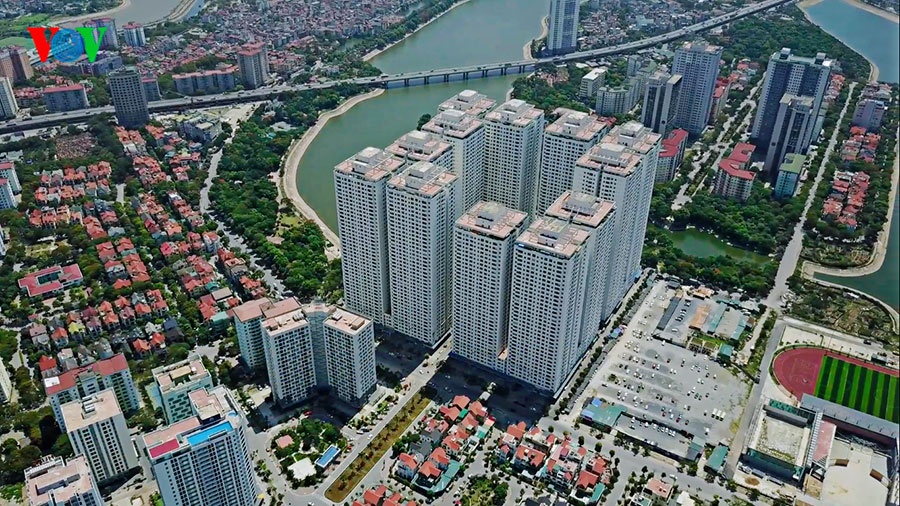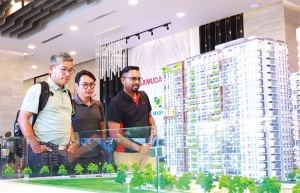Demands for developers to face wasted land sanctions
Residents at the Diplomatic Urban Area located in Bac Tu Liem district of Hanoi in July sent a petition to district authorities to complain about the delay in school-building in the area, even though land plots for schools have been reserved for years.
Resident Nguyen Minh said that the lack of schools is causing inconvenience as parents have to drive their children to other districts for their education.
“We propose that the local authorities ask Hanoi Construction Corporation to build the school already in the development plan as soon as it can, to reduce the pressure from thousands of residents here,” Minh said.
The Diplomatic Urban Area had reserved land for two kindergartens, one primary school, and a high school. But despite the residential buildings being filled up for more than six years, the school plots remain empty fields of grass.
 |
| Demands for developers to face wasted land sanctions, Source:VOV |
The situation is worse in Linh Dam Urban Area in the capital’s Hoang Mai district. This area has almost 100 apartment buildings covering around 100,000 population. Five primary and secondary schools were put into operation, but they can no longer meet the increasing demand of the current population.
Under the plan, six other land plots were reserved for schools of all levels. However, a decade later, only one plot has been used for a primary school and the others are mainly used as parking lots.
According to Tran Huy Anh, a member of the Hanoi Association of Architects, investors who fail to build schools need to be punished. “If investors intentionally do not build a school as part of their project, they must pay the equivalent amount of finance to buy a space with enough room for the number of students in those residential blocks of that project,” Anh said.
Anh added that the government should require investors to build public schools, and not just private schools that charge high tuition fees.
Lawyer Nguyen Van Thang from the Hanoi Bar Association said that the law currently has regulations on administrative fines for investors who do not obey the approved plan and delay schedules.
“A 2017 decree stipulates administrative fines when developers and investors violate regulations on investment in urban development. This includes implementing urban development without following the plan, or leaving projects behind schedule after being approved by competent authorities,” Thang said.
The fine levels, however, are much lower than the investment itself, leaving many developers to ignore them.
Nevertheless, Vietnam’s real estate market has also urban areas which are doing well in planning land use.
According to Savills analysis, Phu My Hung Urban Area, covering 433 hectares in Ho Chi Minh City, has a clear comprehensive development plan in phases lasting for 30 years. During the process, the investor has complied with international development standards, including sustainable development, ensuring construction in accordance with socioeconomic development, and complying with all design and construction regulations.
Meanwhile, in northern Hung Yen province, the 500-ha Ecopark is considered a model of sustainable development with parks, golf courses, schools, hospitals, renewable energy systems, and efficient transportation systems.
 | Vietnam’s real estate thirsty for M&A deals Mergers and acquisitions between domestic and international real estate developers were down in the first half of the year, but could be a future bright spot with Vietnam boasting attractive economic fundamentals and investors biding their time. |
What the stars mean:
★ Poor ★ ★ Promising ★★★ Good ★★★★ Very good ★★★★★ Exceptional
Related Contents
Latest News
More News
- Construction firms poised for growth on public investment and capital market support (February 11, 2026 | 11:38)
- Mitsubishi acquires Thuan An 1 residential development from PDR (February 09, 2026 | 08:00)
- Frasers Property and GELEX Infrastructure propose new joint venture (February 07, 2026 | 15:00)
- Sun Group led consortium selected as investor for new urban area (February 06, 2026 | 15:20)
- Vietnam breaks into Top 10 countries and regions for LEED outside the US (February 05, 2026 | 17:56)
- Fairmont opens first Vietnam property in Hanoi (February 04, 2026 | 16:09)
- Real estate investment trusts pivotal for long-term success (February 02, 2026 | 11:09)
- Dong Nai experiences shifting expectations and new industrial cycle (January 28, 2026 | 09:00)
- An Phat 5 Industrial Park targets ESG-driven investors in Hai Phong (January 26, 2026 | 08:30)
- Decree opens incentives for green urban development (January 24, 2026 | 11:18)

 Tag:
Tag:





















 Mobile Version
Mobile Version